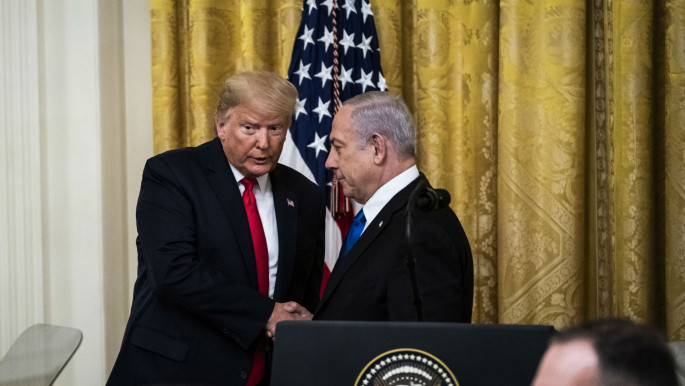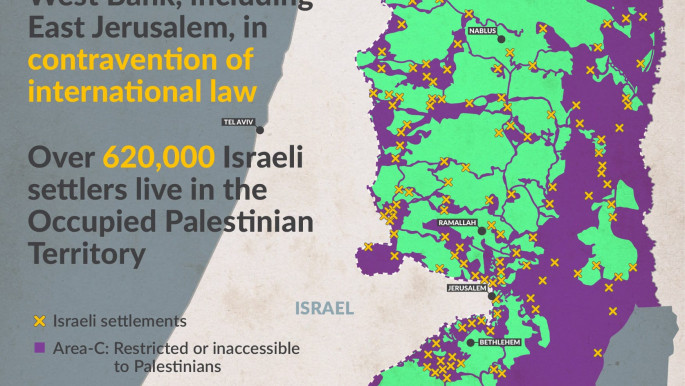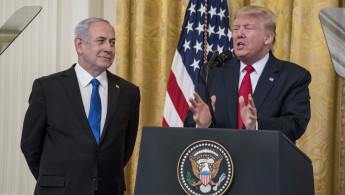No Palestinians present at 'sham' Trump 'Deal of the Century' unveiling
Palestinians were missing from the unveiling ceremony of Donald Trump's so-called "Deal of the Century" peace plan for the Middle East, which has been described as a nail in the coffin of the internationally-recognised two state solution to the Palestine-Israel conflict.
Donald Trump unveiled a new micro-state map of Palestine and said he wanted part of East Jerusalem to serve as the capital of a new State of Palestine but recognises Israeli sovereignty over settlement blocks in the West Bank, a decision contested by Palestinians.
Israeli prime minister Benjamin Netanyahu travelled to the White House where the US president told him there are "many, many countries who want to partake in this. You are going to have tremendous support from your neighbours and beyond your neighbours".
However, such support does not appear to be forthcoming - certainly not from Palestinian leaders.
"The US administration will not find a single Palestinian who supports this project," the Palestinian foreign ministry said in a statement on Sunday.
"Trump's plan is the plot of the century to liquidate the Palestinian cause."
Critics of the plan agreed with this assessment. There were no Palestinian representatives present at the announcement, though ambassadors from Oman, Bahrain and the UAE were present.
|
Egypt and Jordan have peace treaties with Israel, but neither sent delegates.
Read More: Trump's plan leaves Palestinians no option but to reject it. Just as he intended
"You couldn't find a single Palestinian to attend?" asked Daoud Kuttab, a Palestinian columnist with The New Arab.
The lack of Palestinian participation shows that they are not onboard with the plan.
Earlier this week Palestinian leaders threatened to withdraw from key provisions of the Oslo Accords, which define arrangements with Israel, if Trump announced his Middle East "peace plan".
Chief Palestinian negotiator Saeb Erekat told AFP that the Palestine Liberation Organisation (PLO) reserved the right "to withdraw from the interim agreement" of the Oslo pact if Trump unveils his plan.
The Trump initiative will turn Israel's "temporary occupation (of Palestinian territory) into a permanent occupation", Erekat said.
Cold response from Arab states
As the dust settles, only a handful of Arab states have responded to Trump's plans.
The plan calls for the creation of a State of Palestine with its capital in portions of east Jerusalem, ending speculation as to whether his administration, in preparing a proposal without input from Palestinian leaders, would abandon a "two-state resolution" to the conflict.
The plan more than doubles the territories currently under direct Palestinian control, although it recognises Israeli sovereignty over major settlement blocs in the West Bank, something to which the Palestinians will almost certainly object.
Around 200,000 Israeli Jews now live in east Jerusalem in settlement homes considered illegal under international law.
 |
| Trumps's plan is controversial [Getty] |
In the 50-page political outline he said there would also be a four-year "freeze" on new Israeli settlement construction during the time a comprehensive agreement could be negotiated.
Israel has on repeatedly violated UN directives to stop building illegal settlements.
Saudi Arabia was among the few Arab states to issue a statement on the plan.
"The kingdom reiterates its support for all efforts aimed at reaching a just and comprehensive resolution to the Palestinian cause," said the Saudi ministry of foreign affairs in a statement.
The Egyptian ministry of foreign affairs said it "appreciates the continuous efforts exerted by the US administration to achieve a comprehensive and just settlement of the Palestinian issue".
 |
| [Click to enlarge] |
The Qatari News Agency released a statement in which it reiterated the importance of a deal that had international legitimacy.
"The State welcomes all efforts aiming towards a longstanding and just peace in the occupied Palestinian territories" providing it is "consistent with international law and the relevant UN resolutions".
Qatar also called for a Palestinian state "within the 1967 borders, including East Jerusalem" and the right of return.
Jordan and Turkey were critical of the plan. Jordan's Foreign Minister Ayman Safadi warned against "the dangerous consequences of unilateral Israeli measures, such as the annexation of Palestinian lands, the building, and expanaion of illegal Israeli settlements on Palestinian occupied lands and encroachments on the Holy Sites in Jerusalem".
Turkey's ministry of foreign Affairs released a statement saying the "so-called US peace plan is stillborn…this is an annexation plan aiming to destroy the two-state solution and seize the Palestinian territories".
He added: "The people and the land of Palestine cannot be bought off."
Iran described it as "treason of the century".





 Follow the Middle East's top stories in English at The New Arab on Google News
Follow the Middle East's top stories in English at The New Arab on Google News


